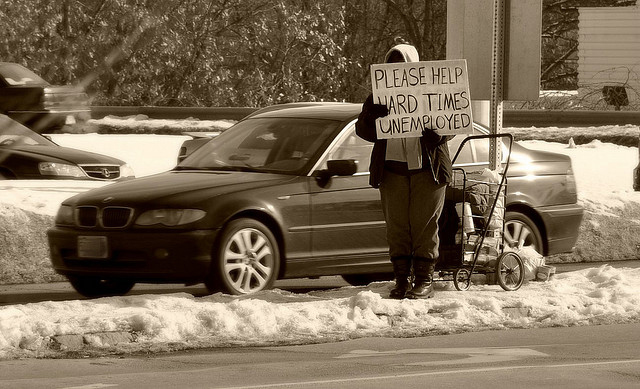
Truthout is a vital news source and a living history of political struggle. If you think our work is valuable, support us with a donation of any size.
The US economy is booming, statistically speaking. The economy has grown more than 13 percent in real terms since its low point in June 2009, and the stock market is at record highs.
Economic growth in the third quarter of 2014 was the strongest in more than a decade and “growth has decisively shifted into higher gear,” according to the Reuters news agency.
Most economists believe that the final quarter of 2014 also saw strong economic growth, though statistics for the fourth quarter have not yet been released. This year’s dramatic decline in oil prices is expected to give the economy a big boost into 2015.
At 66 months and counting, the current economic expansion is the sixth-longest on record.
Five and a half years after the end of the Great Recession, it’s beginning to look like the Great Expansion – if you believe the numbers.
And it’s not over yet. Investment bank Goldman Sachs forecasts 3.1 percent economic growth for 2015 while the International Monetary Fund (IMF) forecasts that real economic growth will top 3 percent per year in both 2015 and 2016.
Business organization The Conference Board forecasts a more modest, but still solid 2.6 percent real GDP growth in 2015.
Of course, there is still the other economy: the millions of Americans in part-time work, in low-wage work and out of work.
Until September 2014, the US economy employed fewer people than before the recession, according to Bureau of Labor Statistics data. The number of full-time employees still hasn’t caught up with 2008 levels, despite the fact that the adult population has grown by 14 million people since then.
What should we expect for the future? Most economists believe that continued economic growth will finally produce higher wages and employment in 2015. Unsurprisingly, the president’s Council of Economic Advisors agrees.
But the economy has now experienced five and a half years of continuous growth. It won’t grow forever. Unless you think that the current economic expansion is one of the most robust periods of economic growth the United States has ever seen, expect another recession soon.
There have been 11 full business cycles since the end of World War II, according to the National Bureau of Economic Research. Over that period, the average length of an expansion after a recession has been 58.4 months.
As of December 2014, the current expansion has already lasted 66 months and is the sixth-longest on record.
If, as widely forecasted, the expansion continues throughout 2015, it will become the fifth-longest on record.
Were the expansion to continue right through to the 2016 presidential elections, it would become the fourth-longest on record.
There is no crystal ball for economic growth and one should always take economic forecasts with a grain of salt. But eventually, someday, there will be another recession, and with it will come another round of job cuts.
With the economy still 10 million jobs in the hole, there may not be much time to create jobs before the next recession cuts them again. When that next recession hits, it will hit hard. Most Americans are not prepared to weather another recession.
How soon we forget that the economy runs in cycles. We need jobs – millions of jobs – and we need them now.
The US economy shed 9 million jobs in the 2007 to 2009 recession and it nearly broke US society. What will happen if the economy sheds another 9 million jobs in the next recession? Or more?
The current recovery has been bad enough for most Americans. Unless we put 10 million people to work in 2015, the next recession will be a disaster. We need another 10 million high-quality, full-time jobs. The private sector is not providing them.
Only government can create jobs on this scale: in education and in health care, in construction and in conservation, in the states and in Washington. Government can do it, but government isn’t doing it. And unless Americans loudly demand better government, it won’t.
Hope for jobs in 2015, but prepare for recession.
A terrifying moment. We appeal for your support.
In the last weeks, we have witnessed an authoritarian assault on communities in Minnesota and across the nation.
The need for truthful, grassroots reporting is urgent at this cataclysmic historical moment. Yet, Trump-aligned billionaires and other allies have taken over many legacy media outlets — the culmination of a decades-long campaign to place control of the narrative into the hands of the political right.
We refuse to let Trump’s blatant propaganda machine go unchecked. Untethered to corporate ownership or advertisers, Truthout remains fearless in our reporting and our determination to use journalism as a tool for justice.
But we need your help just to fund our basic expenses. Over 80 percent of Truthout’s funding comes from small individual donations from our community of readers, and over a third of our total budget is supported by recurring monthly donors.
Truthout’s fundraiser ended last night, and we fell just short of our goal. But your support still matters immensely. Whether you can make a small monthly donation or a larger one-time gift, Truthout only works with your help.